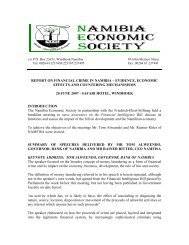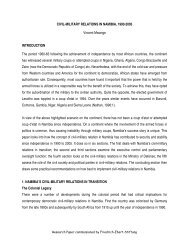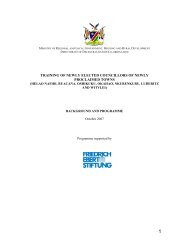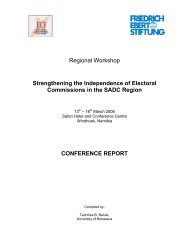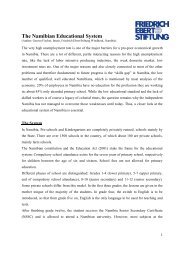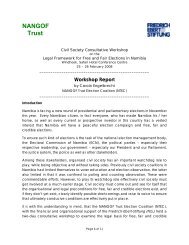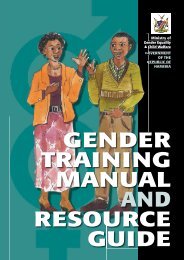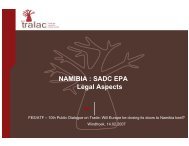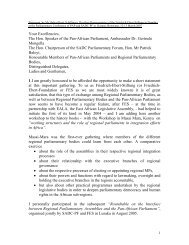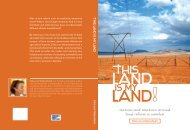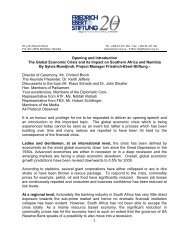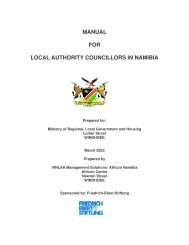Report - Friedrich Ebert Stiftung - Namibia
Report - Friedrich Ebert Stiftung - Namibia
Report - Friedrich Ebert Stiftung - Namibia
You also want an ePaper? Increase the reach of your titles
YUMPU automatically turns print PDFs into web optimized ePapers that Google loves.
Workshop <strong>Report</strong> on Police Labour Relations in <strong>Namibia</strong>: Time for a New Beginning?<br />
generally regulated labour relations in the post-1994 era. After the recognition of<br />
POPCRU not much changed except that structures had to be aligned with the<br />
new Labour Relations Act. We advocated for the abolishment of the Police<br />
Labour Regulations and for the inclusion of the Police within the frame of the<br />
Labour Regulations Act and we successfully lobbied government in that regard.<br />
According to the ILO Conventions Police and Correctional Officers are classified<br />
as essential service and are not allowed to strike. That principle applies in our<br />
case but however, the law makes provisions for an institutionalized dispute<br />
resolution and arbitration processes. This has taken the form of the Safety and<br />
Security Sectoral Bargaining Council, which my colleague will delve on its modus<br />
operandi. This structure assists in promoting and strengthening social dialogue.”<br />
He further dealt with the project on the unionization of the Police in the SADC<br />
and listed a few examples of POPCRU solidarity work.<br />
3.2 A Police Management View<br />
Mr M. Magwentshu, Representative of South Africa Police Services (SAPS),<br />
dealt with the legislative framework pertaining to labour relations in South Africa<br />
as contained inter alia in the Constitution and Labour Relations Act and<br />
elaborated on collective bargaining. The South African Constitution provides that<br />
workers shall have the right to form and join trade unions and employees shall<br />
have the right to form and join employer’s associations. Both shall have the right<br />
to organize and bargain collectively. Workers shall have the right to strike for<br />
purposes of collective bargaining. He stressed that one does not need<br />
permission to exercise these rights entrenched in the Constitution.<br />
The purpose of the Labour Relations Act, 1995 is to regulate the enjoyment of<br />
organizational rights by the trade unions, to promote and facilitate collective<br />
bargaining at the workplace and sectoral level; to regulate the right to strike and<br />
the recourse to lock-out in conformity with the Constitution; to provide user<br />
Page 5



